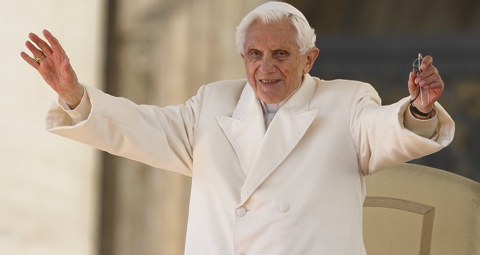February 28 | ![]() 0 COMMENTS
0 COMMENTS ![]() print
print

Strong in Faith: A weekly discussion chaired by young Catholics
DISCUSSION: What do you think of Pope Benedict XVI’s Papacy one year after his retirement? Have your say on this and upcoming topics at http://www.facebook.com/scostronginfaith
GERALD BONNER: I think he will go down in history as one of the great Popes. He achieved a remarkable amount in eight years, and his legacy will mature slowly and bear full fruit in years to come.
His razor sharp mind cut through false views of religion, showing the true relationship of reason and faith; he was like that ‘scribe trained for the Kingdom of Heaven, who is like a householder who brings out of his treasure what is new and what is old’ (Matthew 13:52)—showing by his own example the ‘renewal in continuity’ at the heart of the Second Vatican Council, giving the Church renewed confidence in Her roots to prepare Her for the new evangelisation; Anglicanorum Coetibus was an act of tremendous boldness, wisdom and love, and a great advance for ecumenism.
His extensive writings—Papal and otherwise—will be a rich resource for the Church for a very long time. Thanks be to God for this wise and humble Servant of the Servants of God.
ADAM COATES: Among the post-conciliar Popes, he is by far the most important. What’s more, he’ll be remembered for easily the next 200 years, with his writings, especially on Liturgy, still influencing how we worship, and his writings on the proper interpretation of the Second Vatican Council influencing what we believe.
What’s more, he recognises the unity between these two things: that Lex Orandi, Lex Credendi, Lex Vivendi. I am sure his writings will one day be part of the office of readings.
ANDREW McMANUS: I truly believe that this man has set a monumental standard of humility, faith and love and that his successor has greatly drawn from his Papacy.
Too often in the past year, the Pontificate of Francis has been held in contrast to that of Pope Benedict, often with people highlighting superficial aspects like dress sense, interior design and style of speech. However, the similarities between the two men are staggering. I might even go as far to say that we can best understand the two Popes through the reading of the other.
Pope Francis’ simple ideas of humility and love are, I believe, firmly grounded on the example of Pope Benedict. We only need to look at Benedict’s career as an example of this. From when he requested retirement under Pope John Paul II in the hope of quietly studying in the Vatican Library, to his reluctant, yet obedient, acceptance of the Petrine Ministry, to his break with over 700 years of tradition in regard to his resignation. Aside from his words, which I think puts great emphasis on us having a deep friendship with Christ, his actions are testament to his own deep love for Christ and His Church.
— Have your say on this and upcoming topics at http://www.facebook.com/scostronginfaith
A Papacy full of wisdom, prudence and love
By Aidan Michael Cook
A year after Pope Emeritus Benedict XVI left the Papacy, we can begin to look back at the influence and legacy of his eight years of Papal service.
In many ways, his Papacy can be seen as a kind of ‘retreat’—it was a time to pause and take stock of the state of the Church, to take a deep introspective look at our failings and sins, but all the while rebuilding our foundations and looking forward with hope.
The emphasis during his Papacy on taking a new look at the teachings of the Second Vatican Council and assessing the hermeneutic with which read and we interpret, will, I think, mark a significant moment in our understanding of the council and its place within the wider Tradition.
It was also during his Papacy that the Church really began to face up to the scale of the sexual abuse crisis. He acknowledged that we are seeing anew ‘that the greatest persecution of the Church does not come from outside enemies but is born of sin within the Church, and that the Church thus has a deep need to relearn penance, to accept purification, to learn forgiveness on the one hand, but also the need for justice.’
Of course to say that Pope Benedict and his Papacy were reflective is not to say that were no significant actions or decisions. Indeed, quite the opposite is true. Anglicanorum coetibus, for example, recognised the true and the good within the Anglican tradition while acknowledging the reality that the Anglican Communion as a whole has strayed from Tradition and orthodoxy.
This example of ecumenism in action and not just in dialogue was also reflected in a greater rapprochement with the Eastern Orthodox Churches. A significant part in this was played by Pope Benedict’s motu proprio Summorum Pontificum, which recognised the inestimable depth—and continuing value —of the fullness of the Roman Liturgical tradition. Orthodox leaders at the time praised the move, welcoming its respect for tradition and noting the closeness of the Orthodox and traditional Roman Liturgies.
Of course, the motu proprio was not aimed primarily at an external ecumenism but rather, as Pope Benedict wrote in a letter to bishops, ‘an interior reconciliation in the heart of the Church.’ He recognised the obligation ‘to make every effort to enable for all those who truly desire unity to remain in that unity or to attain it anew.’
The Church cannot be solely inward looking, but Pope Benedict helped us look deep into our heart with purpose: to see our faults and failings and to seek true conversion, recognising our deep desire for God and turning instead to hope and love.
Like his namesake St Benedict, Pope Benedict showed in his Papacy the wisdom and prudence of a true shepherd seeking with loving care to bring his flock to safety, doing all in his power to bring the lost sheep to the fold. His influence and gentle authority will surely be felt for a long time to come.











